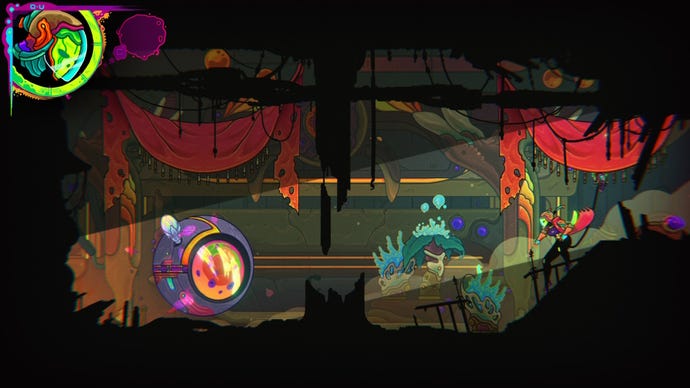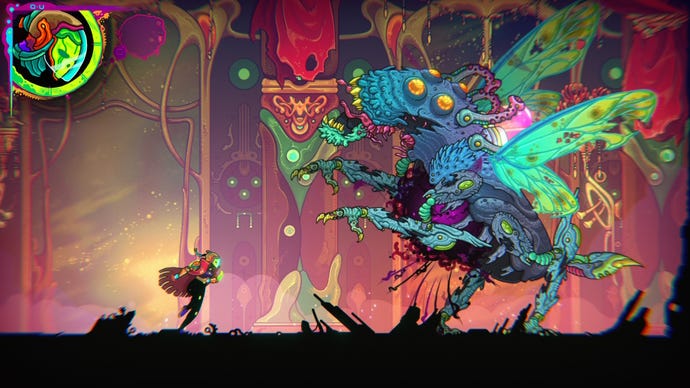How psychedelic gardenvania Ultros would have you "talk" to the aliens
A quick chat with artist El Huervo about influences, from Cthulhu to Spielberg
When playing any character-driven videogame I sometimes experience a sensation akin to my eyes unfocussing, and remember that I'm not, strictly speaking, controlling a body in a world, but interacting with a simulation that includes representations of a body and a world. The character is just an interfacial node in a vast tangle of visible and invisible elements; by moving the character, I cause objects, surfaces, creatures to load or unload, spring into motion or change colour and a million things besides.
Some games foreground these interdependencies by fictionalising the simulation as a giant organism or ecosystem, a more intriguing kind of "living, breathing" environment which is aware of your presence within it. Amongst these games is Ultros, a side-scrolling, psychedelic metroidvania - or as developers Hadoque might prefer, "gardenvania" - which launches next week.
 Ultros - First Look Gameplay Trailer | PS5 & PS4 Games
Ultros - First Look Gameplay Trailer | PS5 & PS4 Games
In Ultros, you explore a huge, verdant, space-going Sarcophagus that exists to contain an ancient, demonic being, but is also a "cosmic uterus" for various other species (one of the developers became a father during its creation, and that experience is writ large in the premise). It's a place of violence but also of nurturing, with players given the choice of tending the indigenous flora or hacking a path to their objectives.
The game's environment art is the work of Niklas "El Huervo" Åkerblad, the Swedish artist and musician who devised the cover art for Hotline Miami and who also worked on Bestest Best adventure Else Heart.Break(). The Sarcophagus is probably his magnum opus, an enveloping greenhouse of stalks and fronds and fleshy mechanisms which, as it were, turns Åkerblad and Hadoque's desire for a nicely joined-up gameworld into a question of anatomy.
Åkerblad looks for this kind of coherence in other gameworlds. "Sonic the Hedgehog spoke to me [as a kid] because I felt the world was more coherent and made more sense to me than Mario, for example," he says. "Which was maybe more fun to play, but the Mario world was like an amalgam of very different ideas, that didn't really feel coherent to me, until I read the comics."
The Sarcophagus isn't just cohesive - it's saturated with the consciousness of its diabolical prisoner. Åkerblad draws a parallel with the work of Lovecraft. "The Cthulhu mythos - how that works is that Cthulhu is dreaming, but has such great psychic powers that, even if it's almost dormant, it still invades people's dreams, and sort of forms reality around it, without necessarily actively interacting with it," he says. "And I feel Ultros is the same."


Aside from the "meta-themes of mental health, life, death, and karmic cycles", to quote the official site, Ultros is preoccupied with the act of communicating with that hidden sleeping presence, or at least, interpreting its messages. The same goes for the smaller organisms you'll meet, fight or tend to along the way. "The alien life in Ultros kind of have the same thoughts and feelings as the player, but convey it in other forms than just oral communication," Åkerblad says. Practical instances of interspecies dialogue include negotiating with territorial insects for passage: you can woo certain oversized bugs by bringing them food.
Åkerblad's influences for the game include Miyazaki and Studio Ghibli - he cites eco-fable Nausicaä Of the Valley Of The Wind especially for its depiction of a "natural world" that is both wondrous and terrifying. But in regards to the act of communicating with nonhuman life, he also points to Western film-makers such as Spielberg.
"Close Encounters of the Third Kind, with the music and everything - I feel like, why don't we get into that more?" he says. "I really like the way the aliens in that film communicate with us through music, because they can sort of better convey emotions that might resonate with us. And I think of the aliens in Arrival - like their language, and how language forms a culture, is very interesting. But I feel like it's more like a visual thing, with the 'coffee stain' circles they're doing. And the level of complexity in that language seems a bit [gratuitous] - to me it feels unnecessary to have such a complex writing language."
 Heptapod- Arrival 2016
Heptapod- Arrival 2016
It doesn't sound like you'll be penning letters to a demon in the game, though the world isn't devoid of the written word - Hadoque fall back on descriptive text for elements like control inputs or dialogue with certain characters. Still, Ultros remains an enigma. "It's like an entity that exists on different planes to us, and thus affects its environment subconsciously," Åkerblad goes on. "Or not even like that. It's more like how an artist does things - like, if you paint a painting, there is an intent, but it might land very differently with the viewer, if you understand what I'm saying. So Ultros influences its environment, but you might interpret it differently."
It's tempting to read this remark as an accidental spoiler. If Åkerblad himself turns out to be the demon at the centre of the Sarcophagus, a la John Romero and the Icon of Sin, you heard about it here first. Anyway, if you like the cut of all this, and I'm certainly keen to have a delve, there's still time to try the demo before next week's launch - and Katharine's full review.















